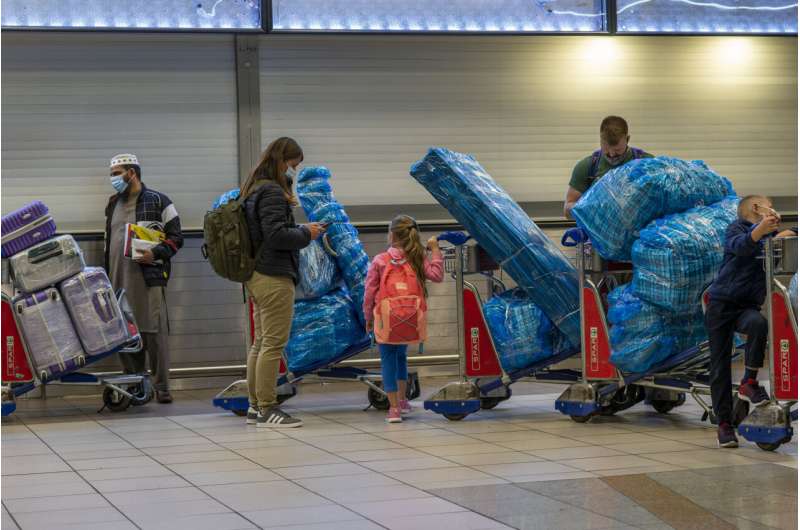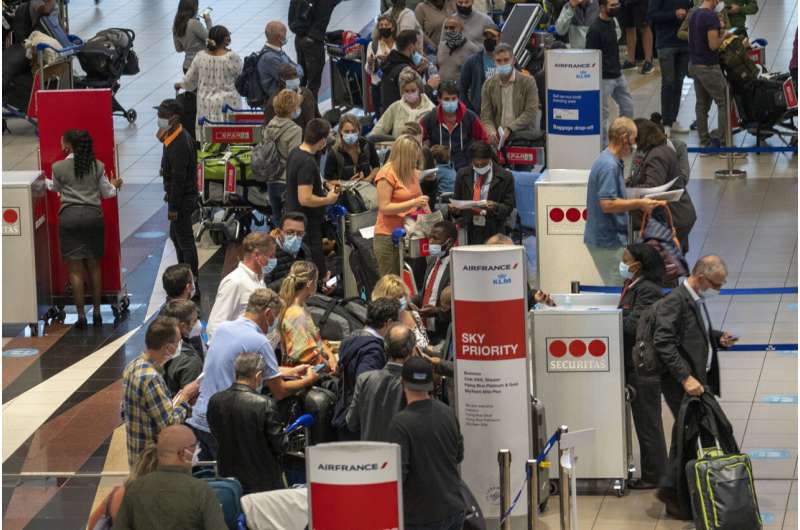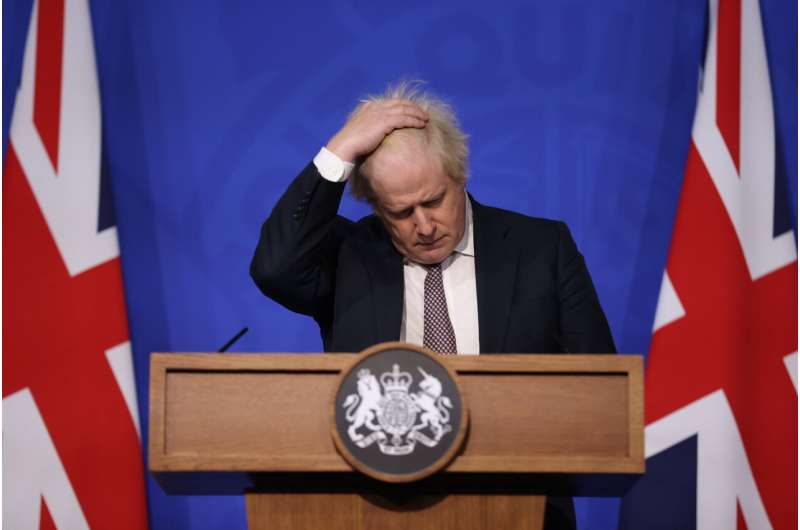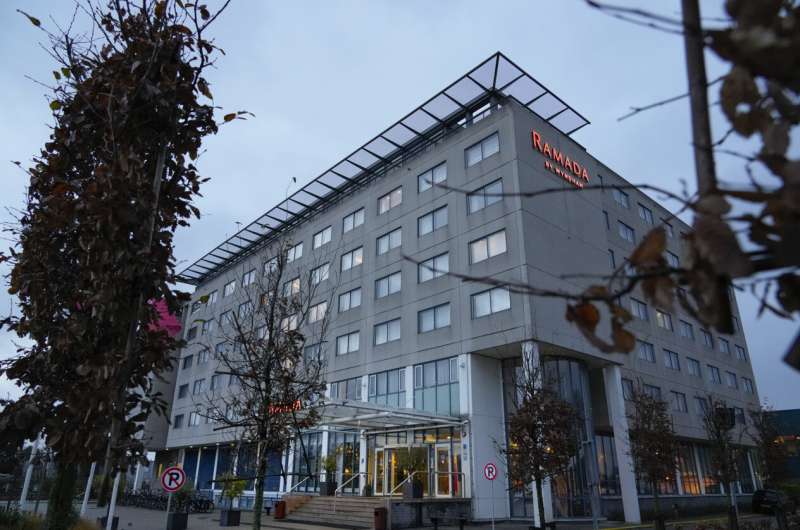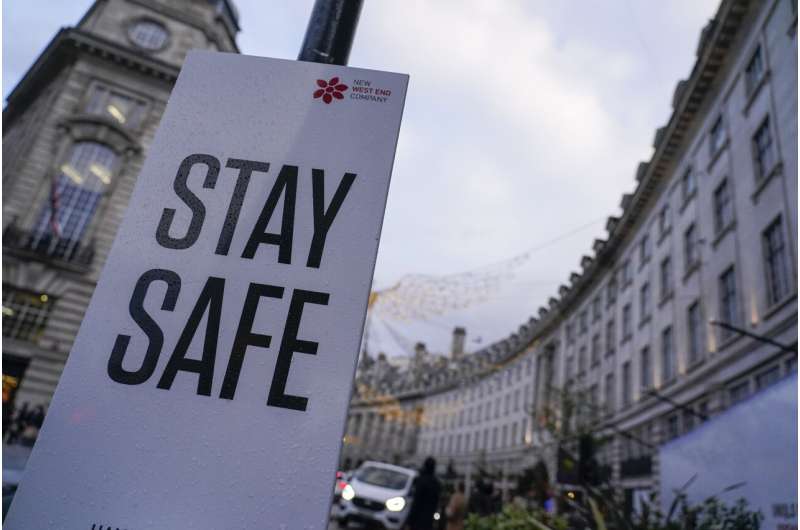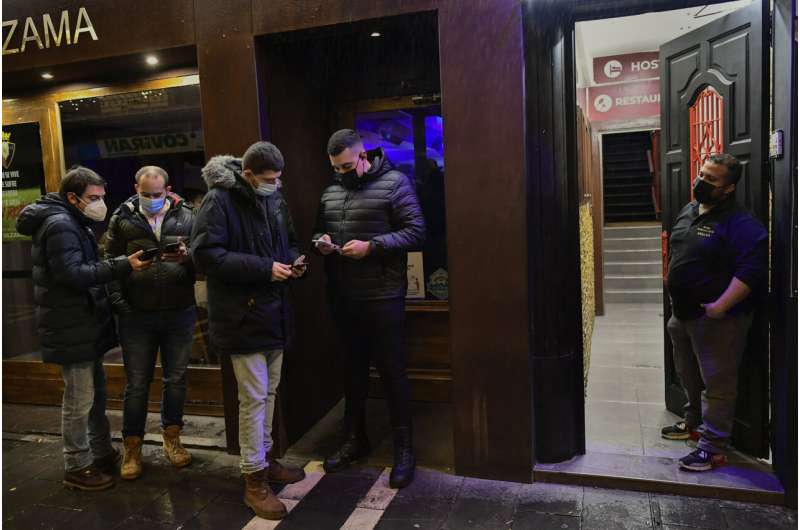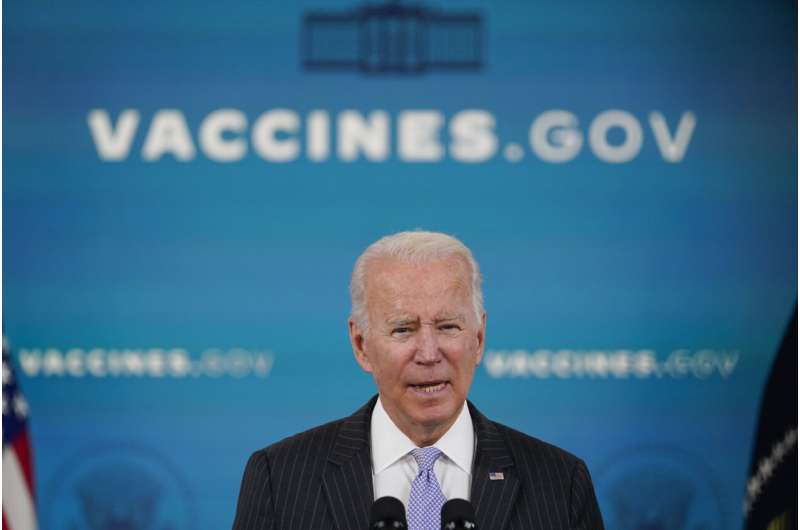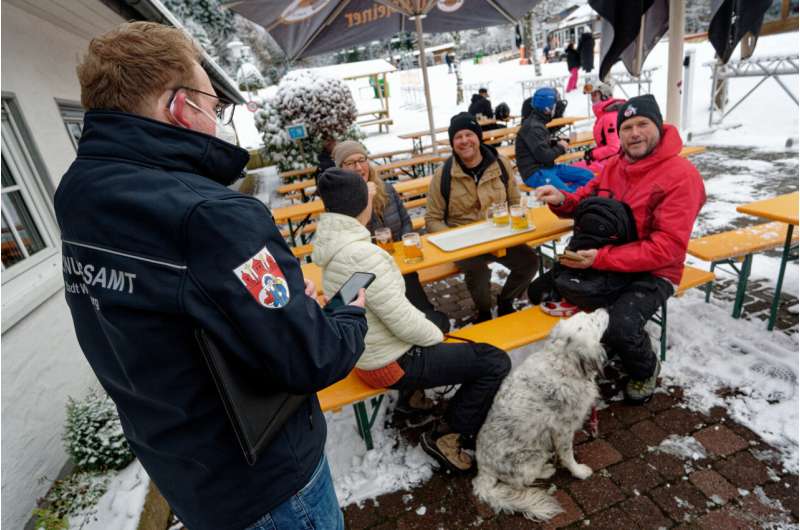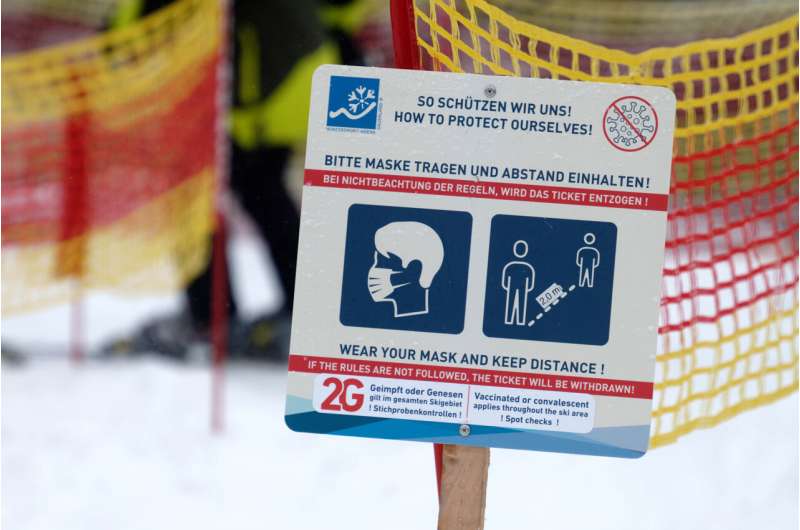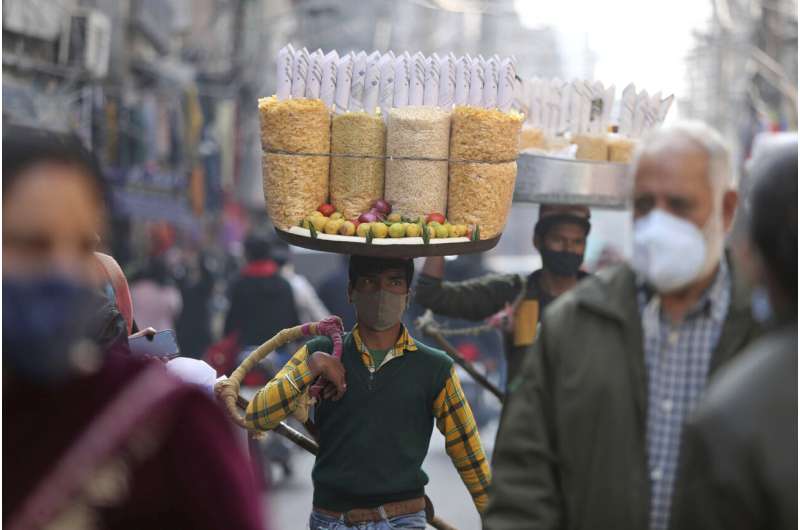People line up to get on an overseas flight at OR Tambo International Airport in Johannesburg, South Africa, Nov. 26, 2021. As the world grapples with the emergence of the new highly transmissible variant of COVID-19, worried scientists in South Africa—where omicron was first identified—are scrambling to combat its lightning spread across the country. Credit: AP Photo/Jerome Delay, File
The U.K. tightened up rules Saturday on mask-wearing and on testing of international arrivals after finding two cases of the new potentially more contagious omicron variant of the coronavirus that was identified just a few days ago in South Africa.
Amid fears that the new variant has the potential to be more resistant to the protection offered by vaccines, there are growing concerns around the world that the pandemic and associated lockdown restrictions will persist for far longer than hoped.
Nearly two years on since the start of the pandemic that has claimed more than 5 million lives around the world, countries are on high alert. Many countries have already imposed travel restrictions on flights from southern Africa as they seek to buy time to assess whether the omicron variant is more transmissable than the current dominant delta variant.
In an attempt to slow the spread in the U.K., British Prime Minister Boris Johnson said it was necessary to take "targeted and precautionary measures" after two people tested positive for the new variant in England.
"Right now this is the responsible course of action to slow down the seeding and the spread of this new variant and to maximize our defenses," he told a news conference.
Among the measures announced, Johnson said anyone arriving in England will be asked to take a a mandatory PCR test for COVID-19 on the second day after their arrival and must self isolate until they provide a negative test. And if someone tests positive for the omicron variant, then he said their close contacts will have to self-isolate for 10 days regardless of their vaccination status—currently close contacts are exempt from quarantine rules if they are fully-vaccinated.
People queue to get on the Air France flight to Paris at OR Tambo's airport in Johannesburg, South Africa, Nov. 26, 2021. As the world grapples with the emergence of the new highly transmissible variant of COVID-19, worried scientists in South Africa—where omicron was first identified—are scrambling to combat its lightning spread across the country. Credit: AP Photo/Jerome Delay, File
He also said mask-wearing in shops and on public transport will be required and said the independent group of scientists that advises the British government on the rollout of coronavirus vaccines has been asked to accelerate the vaccination program. This could involve widening the booster program to younger age groups, reducing the time period between a second dose and a booster and allowing older children to get a second dose.
"From today we're going to boost the booster campaign," he said.
Britain's Department of Health said the two cases found in the U.K. were linked and involved travel from southern Africa. One of the two new cases was in the southeastern English town of Brentwood, while the other is in the central city of Nottingham. The two confirmed cases are self-isolating with their households while contact tracing and targeted testing takes place.
Britain's Prime Minister Boris Johnson gestures as he speaks during a press conference in London, Saturday Nov. 27, 2021, after cases of the new COVID-19 variant were confirmed in the UK. Credit: Hollie Adams/Pool via AP
The British government also added four more countries—Angola, Malawi, Mozambique and Zambia—onto the country's travel red list from Sunday. Six others—Botswana, Eswatini (formerly Swaziland), Lesotho, Namibia, South Africa and Zimbabwe—were added Friday. That means anyone permitted to arrive from those destinations will have to quarantine.
Many countries have slapped restrictions on various southern African countries over the past couple of days including Australia, Brazil, Canada, the European Union, Iran, Japan, Thailand and the United States, in response to warnings over the transmissability of the new variant—against the advice of the World Health Organization.
Despite the banning of flights, there are mounting concerns that the variant has already been widely seeded around the world. In addition to the U.K, cases have been reported in travelers in Belgium, Israel and Hong Kong.
Exterior view of the hotel in Badhoevedorp near Schiphol Airport, Netherlands, where Dutch authorities have isolated 61 people who tested positive for COVID-19 on two arriving flights originating from South Africa, Saturday, Nov. 27, 2021. Authorities are carrying out further investigations to see if any of the travelers have the omicron variant. Credit: AP Photo/Peter Dejong
Germany also said it suspected three positive cases while Italy was investigating a recently returned positive case from southern Africa. Dutch authorities were also testing whether 61 people who arrived on two flights from South Africa with COVID-19 have the omicron variant. And Israel said it is tracing 800 travelers who returned recently from southern African countries.
The variant's swift spread among young people in South Africa has alarmed health professionals even though there was no immediate indication whether the variant causes more severe disease.
A number of pharmaceutical firms, including AstraZeneca, Moderna, Novavax and Pfizer, said they have plans in place to adapt their vaccines in light of the emergence of omicron. Pfizer and its partner BioNTech said they expect to be able to tweak their vaccine in around 100 days.
-
A sign reading 'Stay safe' in Regent Street, in London, Friday, Nov. 26, 2021. A slew of nations moved to stop air travel from southern Africa on Friday, and stocks plunged in Asia and Europe in reaction to news of a new, potentially more transmissible COVID-19 variant. Credit: AP Photo/Alberto Pezzali
-
A doorman controls European passport COVID-19 to customers before the access of a bar discotheque, in Pamplona, northern Spain. Saturday, Nov. 27, 2021. Some Spanish regional communities demand from this midnight European passport COVID-19, Navarra Community one of them, in an effort to try to control the pandemic with a high curve of cases. Credit: AP Photo/Alvaro Barrientos
-
President Joe Biden talks about the newly approved COVID-19 vaccine for children ages 5-11 from the South Court Auditorium on the White House complex in Washington, Nov. 3, 2021. Biden's team views the pandemic as the root cause of both the nation's malaise and his own political woes. It sees getting more people vaccinated and finally controlling COVID-19 as the key to reviving the country and Biden's own standing. But the coronavirus has proved to be a vexing challenge for the White House. Credit: AP Photo/Susan Walsh, File
-
A public order official checks the COVID-19 vaccination certificates of skiers at the Rauher Busch ski slope in Winterberg, Germany, Saturday, Nov. 27, 2021. Credit: Henning Kaiser/dpa via AP
-
A sign indicating COVID-19 restrictions is seen at the Rauher Busch ski slope in Winterberg, Germany, Saturday, Nov. 27, 2021. Credit: Henning Kaiser/dpa via AP
-
A snacks vendor wears a face mask as a precaution against COVID-19 and walks in a market area in Jammu, India, Saturday, Nov. 27, 2021. Credit: AP Photo/Channi Anand
Professor Andrew Pollard, the director of the Oxford Vaccine Group which developed the AstraZeneca vaccine, expressed cautious optimism that existing vaccines could be effective at preventing serious disease from the omicron variant, noting that most of the mutations appear to be in similar regions as those in other variants.
"At least from a speculative point of view we have some optimism that the vaccine should still work against a new variant for serious disease but really we need to wait several weeks to have that confirmed," he told BBC radio.
Some experts said the variant's emergence illustrated how rich countries' hoarding of vaccines threatens to prolong the pandemic.
Fewer than 6% of people in Africa have been fully immunized against COVID-19, and millions of health workers and vulnerable populations have yet to receive a single dose. Those conditions can speed up spread of the virus, offering more opportunities for it to evolve into a dangerous variant.
"One of the key factors to emergence of variants may well be low vaccination rates in parts of the world, and the WHO warning that none of us is safe until all of us are safe and should be heeded," said Peter Openshaw, a professor of experimental medicine at Imperial College London.
© 2021 The Associated Press. All rights reserved. This material may not be published, broadcast, rewritten or redistributed without permission.
